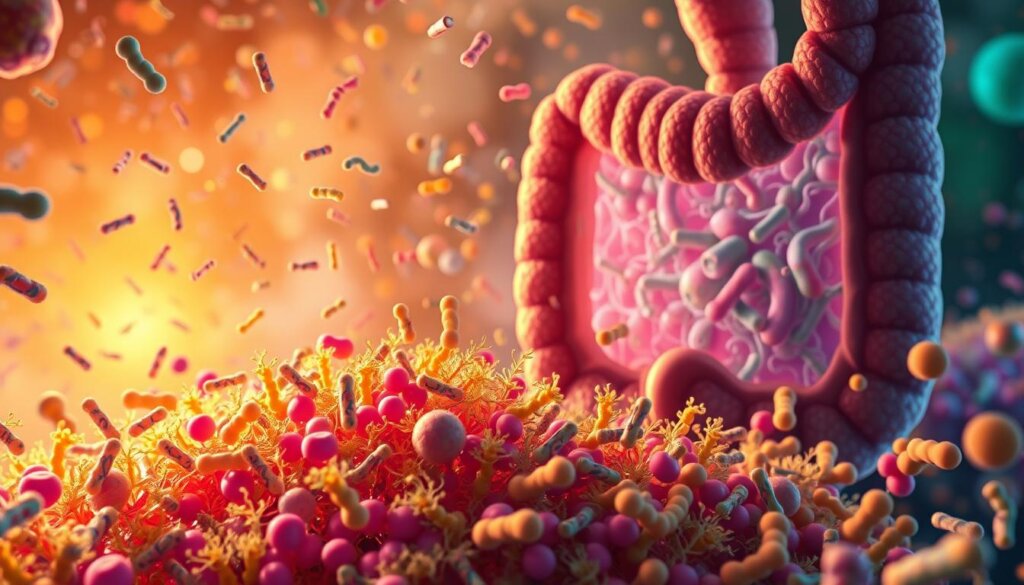Trillions of microorganisms call your body home, working silently to keep you healthy. These tiny allies—bacteria, fungi, and viruses—form a bustling ecosystem known as the microbiome. But when companies claim their probiotic supplements can “fix” your gut, does the science back the hype?
Probiotics are live microbes designed to support your body’s natural balance. Found in supplements, yogurts, and fermented foods, they’re marketed as solutions for everything from digestion to immunity. Yet confusion persists: Do these products deliver real benefits, or are they just cleverly packaged promises?
In Malaysia, where diverse diets meet modern lifestyles, understanding probiotics matters. A recent study highlights how specific strains thrive in tropical climates, influencing their effectiveness. But not all products are equal—some strains work better for bloating, while others target skin health.
This guide cuts through the noise. You’ll learn how probiotics interact with your unique biology, why strain selection matters, and how to spot evidence-based options. Ready to separate fact from fiction? Let’s dive in.
Key Takeaways
- Probiotics are live microorganisms that support your body’s natural microbiome.
- Effectiveness depends on strain type, dosage, and individual health needs.
- Malaysia’s climate and cuisine influence which probiotic strains work best locally.
- Supplements and fermented foods differ in microbial diversity and potency.
- Consulting professionals ensures personalized choices for gut health goals.
Understanding Probiotics and Their Benefits
Your gut isn’t just a digestion hub—it’s a hidden metropolis teeming with life. These microscopic residents form communities that shape everything from nutrient absorption to immune defenses. Let’s explore how probiotics interact with this complex world.
What Are Probiotics and How Do They Work?
Probiotics deliver live microbes designed to reinforce your body’s natural bacterial networks. Think of them as reinforcements for your gut’s existing population. For example, your large intestine houses roughly 39 trillion bacteria that break down fiber and produce vitamins like B12.

When imbalances occur—known as dysbiosis—these microbial allies struggle to protect you. Probiotics help by crowding out harmful invaders and restoring equilibrium. However, their success depends on surviving stomach acid and matching your unique microbiome composition.
Scientific Insights on Beneficial Bacteria and the Microbiome
Research shows not all beneficial bacteria behave the same. Specific strains target different issues, like reducing inflammation or supporting mental health through the gut-brain axis. A recent analysis highlights three key health benefits linked to certain strains, including enhanced immune responses.
Your microbiome acts like a fingerprint—distinct and ever-changing. Factors like diet, climate, and genetics determine which microbes thrive. In Malaysia’s tropical environment, heat-resistant strains often prove more effective for locals.
Scientists emphasize quality over quantity: a supplement with 10 billion CFUs means little if the strains can’t survive digestion. Always check labels for clinically tested varieties tailored to your needs.
How effective are probiotics?
With shelves lined with probiotic products, many wonder if these supplements live up to their bold claims. Research reveals a nuanced picture: while helpful for targeted issues, their broad-spectrum benefits remain unproven.
Evaluating Probiotic Efficacy in Gut Health
Studies show microbial supplements work best when addressing specific imbalances. For those with healthy digestion, probiotics often show minimal impact. A 2023 analysis found they’re most effective when treating diagnosed gut-related disease, not as daily maintenance.

Impact on Conditions Like Irritable Bowel Syndrome
For irritable bowel syndrome (IBS), evidence grows stronger. A review of 30+ trials found certain strains reduce abdominal pain and irregular bowel movements by up to 40%. However, relief varies widely—what works for diarrhea-predominant IBS might not help constipation cases.
| Condition | Probiotic Benefit | Research Support |
|---|---|---|
| IBS (General) | Reduces bloating & discomfort | Strong |
| IBS-D (Diarrhea) | Slows bowel movements | Moderate |
| IBS-C (Constipation) | Improves stool frequency | Limited |
Those experiencing persistent digestive symptoms may benefit most. Scientists caution that strain selection matters—a Bifidobacterium blend could ease inflammation, while Lactobacillus might target harmful microbes.
Integrating Probiotics Into a Healthy Malaysian Lifestyle
Balancing modern convenience with traditional wisdom shapes how Malaysians approach gut health. Local nutrition experts emphasize food-first strategies, especially when taking probiotics becomes part of daily routines.
Incorporating Probiotic-Rich Foods and Daily Supplements
Fermented dishes like tapai (fermented glutinous rice) and tempoyak (durian paste) offer natural microbial benefits. These culturally familiar foods often pair well with staples like rice or fresh vegetables. Yogurt remains a popular choice, providing calcium alongside live cultures.
While probiotic supplements flood pharmacy shelves, their unregulated nature raises concerns. A 2023 audit found only 35% of Malaysian-market supplements matched their label claims. For general wellness, fermented cabbage or homemade kombucha often prove more reliable than pills.
Wellness Group Contact and Service Hours for Expert Guidance
Those considering a daily probiotic supplement should consult professionals. The Wellness Group Malaysia helps residents navigate options through personalized consultations. Reach their team via WhatsApp at +60123822655 during operating hours:
- Monday-Friday: 9:30am-6:30pm
- Saturday: 10am-5pm
- Sunday: Closed
For those exploring probiotic strategies to combat fatigue, experts analyze diet patterns and lifestyle factors. They determine whether fermented foods or targeted supplements better suit individual needs—a crucial step given Malaysia’s unique climate and cuisine influences on gut health.
Navigating Probiotics in the Marketplace
Step into a Malaysian supermarket, and you’ll find probiotics in places you’d never expect—from breakfast cereals to skincare aisles. This explosion of products creates both opportunity and confusion. How do you separate science-backed options from marketing gimmicks?
Understanding Different Forms
Supplements dominate shelves, but traditional options like yogurt and tempeh often deliver more viable microbes. Fermented foods drinks like kombucha gain popularity, though their bacterial counts vary widely. A granola bar boasting “probiotic benefits” might contain fewer live cultures than a spoonful of kimchi.
Prebiotics play silent partner to these microbes. Found in oats, bananas, and beans, they feed good bacteria already in your gut. Pairing them with probiotic-rich products creates a symbiotic effect—like fertilizing a garden before planting seeds.
Assessing Manufacturer Claims
Many manufacturers prioritize bacterial quantity over quality. “Strains chosen for industrial scalability might not survive digestion,” notes a clinical review. Unlike medications, most supplements undergo no third-party testing—labels may overstate CFU counts or strain specificity.
Smart shoppers check for:
- Storage requirements (refrigeration often ensures viability)
- Expiration dates (live cultures have limited shelf lives)
- Strain identification (look for codes like Lactobacillus rhamnosus GG)
When cookies or cosmetics claim probiotic benefits, ask: Do these microbes survive processing? Can they colonize human intestines? Sometimes, marketing outpaces science—a reminder that not all products live up to their labels.
Conclusion
Science reveals that probiotics shine brightest in targeted scenarios rather than as universal fixes. For those with balanced gut ecosystems, these microbes often provide minimal benefits—a fact obscured by bold marketing claims. Research consistently shows their value lies in addressing specific imbalances, not boosting general health.
Your body’s microbial community operates like a fingerprint: unique and ever-changing. What thrives in one person’s gut might struggle in another’s. This explains why cookie-cutter supplements often disappoint. Emerging studies emphasize personalized approaches, matching microbial strains to individual system needs.
In Malaysia’s diverse climate, selecting heat-resistant strains matters. Consulting professionals helps identify solutions that collaborate with your existing microbes, not overwhelm them. While fermented foods offer natural support, supplements require scrutiny for strain specificity and viability.
Ultimately, realistic expectations win. Probiotics aren’t magic bullets but tools best used strategically. Pairing research-backed choices with expert guidance ensures your gut remains a thriving, resilient ecosystem.
FAQ
Can probiotics improve digestive issues like irritable bowel syndrome?
Research suggests certain strains may help relieve symptoms like bloating or irregular bowel movements. However, results vary, and consulting experts like Wellness Group Malaysia ensures personalized advice for gut health needs.
Are probiotic supplements better than natural sources like yogurt?
Supplements offer concentrated doses, while fermented foods provide diverse nutrients. Combining both often works best. Brands like Bio-Kult or Garden of Life prioritize quality, but checking labels for live cultures matters most.
How long does it take for probiotics to show benefits?
Some notice changes in 1–2 weeks, while others need months. Consistency with prebiotic-rich foods like bananas or garlic supports the microbiome. Wellness Group Malaysia recommends tracking symptoms for clearer insights.
Can probiotics interact with medications or cause side effects?
Mild gas or bloating might occur initially. Those on immunosuppressants or antibiotics should consult doctors first. Reputable manufacturers like Renew Life include usage guidelines to minimize risks.
Do children or pregnant women benefit from probiotics?
Pediatricians often recommend specific strains for colic or allergies. Prenatal formulas like Culturelle support maternal gut health. Always verify safety certifications and dosage with healthcare providers.
How do I choose a high-quality probiotic supplement?
Look for CFU counts (10–20 billion), survivability features like delayed-release capsules, and third-party testing. Brands like Align or Florastor meet strict standards, but Wellness Group Malaysia’s team can help narrow options.
Are there specific probiotics for immune system support?
Strains like Lactobacillus rhamnosus or Bifidobacterium lactis are linked to immune health. Pairing them with vitamin C-rich foods like guava or bell peppers enhances their effectiveness.
Should probiotics be taken with meals or on an empty stomach?
Most work best with food, as stomach acid can reduce potency. Time-released formulas or drinks like kombucha bypass this issue. Follow manufacturer instructions for optimal results.






